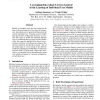Free Online Productivity Tools
i2Speak
i2Symbol
i2OCR
iTex2Img
iWeb2Print
iWeb2Shot
i2Type
iPdf2Split
iPdf2Merge
i2Bopomofo
i2Arabic
i2Style
i2Image
i2PDF
iLatex2Rtf
Sci2ools
IJCAI
2001
2001
Leveraging Data About Users in General in the Learning of Individual User Models
Models of computer users that are learned on the basis of data can make use of two types of information: data about users in general and data about the current individual user. Focusing on user models that take the form of Bayesian networks, we compare four types of model that represent different ways of combining these two types of data. Models of the four types are applied to the data of an experiment, and they are evaluated according to theoretical, empirical, and practical criteria. One of the model types is a new variant of the AHUGIN method for adapting the probabilities of a Bayesian network while it is being used: Differential adaptation is a principled way of determining the speed with which each aspect of a network is adapted to an individual user.
Related Content
| Added | 31 Oct 2010 |
| Updated | 31 Oct 2010 |
| Type | Conference |
| Year | 2001 |
| Where | IJCAI |
| Authors | Anthony Jameson, Frank Wittig |
Comments (0)

